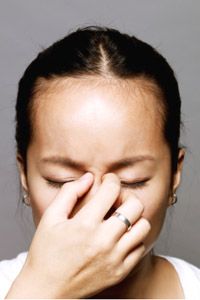When we think of a food allergy, we usually imagine a person breaking out in hives, coughing, having trouble breathing, or even suffering from anaphylactic shock, a life-threatening allergic reaction. But food allergies -- the immune system's way of fighting off "invaders" that it thinks are harmful to the body -- can cause less obvious symptoms, as well. These include behavioral symptoms, such as depression, irritability, night waking, anxiety, hyperactivity, excessive talking and attention deficit. It's difficult to come to the realization that behavior changes may be caused by food allergies because noticing changes in behavior is subjective. Usually, although not always, food allergies cause more than one symptom, so you should be able to pair the behavioral changes with reactions of your respiratory system, gastrointestinal system or skin. If you notice these symptoms and changes in your behavior after eating a particular food, an allergy may be to blame.
If you suspect that you may have a food allergy, you should go see your allergist. He or she can test you for allergies with a blood test or a skin prick test, in which a diluted form of the allergen will be applied to a scratch on your skin to see if there is a reaction. You may also have to try an elimination diet, which removes common food allergens, such as dairy, nuts, fish and shellfish from your diet until you figure out which food or foods is causing the behavior. If you do have a food allergy, you'll have to avoid contact with that food and may be prescribed medication in case you have an allergic reaction. If you have a severe allergy, your doctor should give you epinephrine to keep with you just in case.
Advertisement

